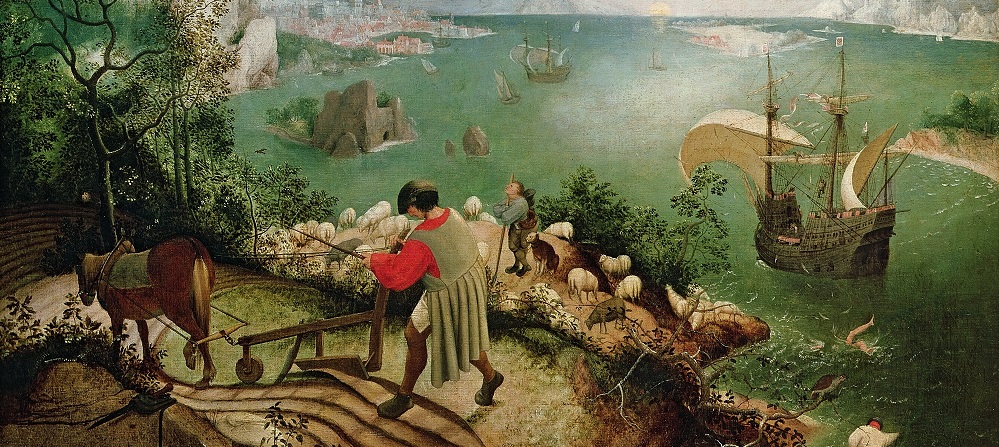奥登·《美术馆》·《伊卡鲁斯》·查良铮·余光中
“Landscape with the Fall of Icarus” by Pieter Bruegel
Musee des Beaux Arts
by W. H. Auden
About suffering they were never wrong,
The Old Masters; how well, they understood
Its human position; how it takes place
While someone else is eating or opening a window or just walking dully along;
How, when the aged are reverently, passionately waiting
For the miraculous birth, there always must be
Children who did not specially want it to happen, skating
On a pond at the edge of the wood:
They never forgot
That even the dreadful martyrdom must run its course
Anyhow in a corner, some untidy spot
Where the dogs go on with their doggy life and the torturer’s horse
Scratches its innocent behind on a tree.In Breughel’s Icarus, for instance: how everything turns away
Quite leisurely from the disaster; the ploughman may
Have heard the splash, the forsaken cry,
But for him it was not an important failure; the sun shone
As it had to on the white legs disappearing into the green
Water; and the expensive delicate ship that must have seen
Something amazing, a boy falling out of the sky,
Had somewhere to get to and sailed calmly on.
美术馆
查良铮 译
关于苦难他们总是很清楚的,
这些古典画家:他们多么深知它在
人心中的地位,深知痛苦会产生,
当别人在吃,在开窗,或正作着无聊的散步的时候;
深知当老年人热烈地、虔敬地等候
神异的降生时,总会有些孩子
并不特别想要他出现,而却在
树林边沿的池塘上溜着冰。
他们从不忘记:
即使悲惨的殉道也终归会完结
在一个角落,乱糟糟的地方,
在那里狗继续过着狗的生涯,而迫害者的马
把无知的臀部在树上摩擦。在勃鲁盖尔的《伊卡鲁斯》里,比如说;
一切是多么安闲地从那桩灾难转过脸:
农夫或许听到了堕水的声音和那绝望的呼喊,
但对于他,那不是了不得的失败;
太阳依旧照着白腿落进绿波里;
那华贵而精巧的船必曾看见
一件怪事,从天上掉下一个男孩,
但它有某地要去,仍静静地航行。
美术馆
余光中 译
说到苦难,他们从未看错,
古代那些大师:他们深切体认
苦难在人世的地位;当苦难降临,
别人总是在进食或开窗或仅仅默然走过;
当长者正虔诚地、热烈地等,
等奇迹降临,总有孩子们
不特别期待它发生,正巧
在林边的池塘上溜冰:
大师们从不忘记
即使可怖的殉道也必须在一隅
独自进行,在杂乱的一隅
一任狗照常过狗的日子,酷吏的马匹
向一颗树干摩擦无辜的后臀。例如布鲁果的《伊卡瑞斯》,众人
都悠然不顾那劫难,那农夫可能
听见了水波溅洒,呼救无望,
但是不当它是惨重的牺牲;阳光灿照,
不会不照见白净的双腿没入碧湛
的海波;那豪华优雅的海舟必然看见
一幕奇景,一童子自天而降,
却有路要赶,仍安详地向前航行。
